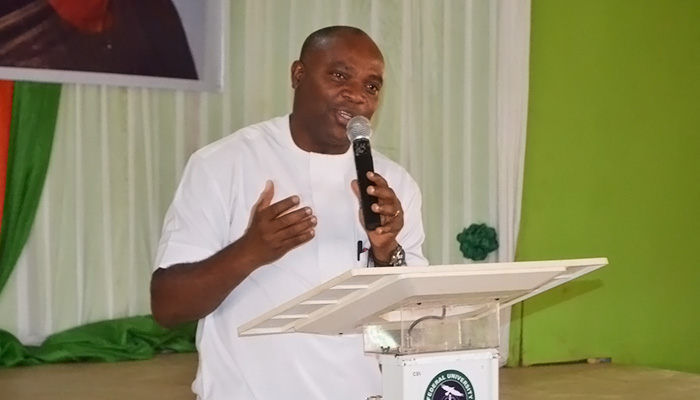The Nigerian Environmental Study Action Team (NEST) on Monday, February 24, 2025, at a virtual session officially launched a community-based project with the aim of building community resilience towards climate change by responding to sub-national needs and contributing to national adaptation targets.

Project Coordinator, Professor Emmanuel Nzegbule, disclosed that the community-based project, titled “Scaling-Up Climate Resilience and Natural Solutions in Communities through Practice, Strengthening Inclusiveness, and Advocacy in Nigeria (SCRNSC)” will be funded by the Pan African Climate Justice Alliance (PACJA).
He said: “The one-year SCRNSC planned to cover four ecological zones in Nigeria has commenced with a pilot scheme in Abia State and will be extended to Borno, Cross River, Enugu, Nasarawa, and Oyo states in the coming months.
The Project Coordinator listed the expected impact of the project to include: “Enhancing climate resilience to address location specific adaptation needs with nature-based climate solutions; providing evidence-based data to support adaptation solutions to build institutional and community levels actions; improving equitable participation and implementation of resilient approaches that favor vulnerable groups; and, enabling the sub-nationals to have increased capacity to develop climate change resilient action and advocacy plans and increased youth climate activism.”
Professor Nzegbule added: “This community driven intervention comes at a period Nigeria is classified as one of the 10 most vulnerable countries in the world with over 216 million citizens facing huge food crises and climate change worsening underlying challenges in the agricultural sector.
“Though the Federal Government of Nigeria and States have taken up various sectoral initiatives to diversify the economy for sustainable development as well as to meet commitment to the Paris Agreement through low-carbon development strategies, these commendable efforts will be jeopardised without addressing the impact of climate change.”
Prof. Chinedum Nwajiuba, Chairman, Board of Directors of NEST, in his remarks stated: “Over 216 million Nigerians face huge food crises with the prevailing impact of climate change that is worsening other agricultural production challenges like land degradation, post-harvest losses and huge reliance on rainfall and pest and diseases.
“Both the Federal Government of Nigeria and its sub-nationals have undertaken initiatives to diversify the economy for sustainable development and to meet national commitment to the Paris Agreement through low-carbon development strategies in the key economic sectors
“These commendable efforts will be jeopardized without addressing the impact of climate change on the key sectors. Concerted efforts by international, national and sub-national, civil societies and communities are urgently needed to identify and deploy effectively climate change solutions and to equitably reach the most vulnerable groups in the society,” he stressed.
In her submission, Dr. Gloria Chinwe Njor, Executive Director of NEST, opined that the sustainable development organisation was founded in 1987 and has successfully handled such intervention in the past, also noted that NEST is open to further collaborations with stakeholders in the climate change circle towards achieving desired results.
The SCRNSC project featured remarks from other notable participants such as Dr. Iniobong Abiola-Awe, Director, Department of Climate Change, Federal Ministry of Environment; Dr. Augustine Njamnshi, Executive Director, Africa Coalition for Sustainable Energy Access (ACSEA) and Chair of the Political and Technical Affairs Committee of PACJA; Dr. Nkama Nkem Nkama, Chairman, House of Representatives Committee on Climate Change; Sam Onuigbo, ofrmer Member and Chair, House of Representatives Committee on Climate Change, among other stakeholders.
By Ajibola Adedoye
